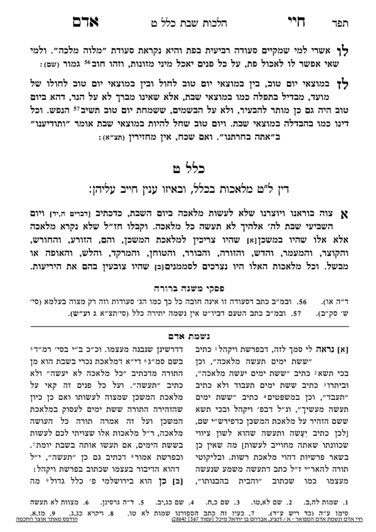We are continuing in siman 1. The Chayei Adam begins to list the melachos. Each of these melachos will be expanded upon, including their avos and toldos, in later simanim:
- Zoreah, planting;
- Choreish, plowing and any other actions performed for preparing the ground for planting;
- Kotzeir; detaching something from its source of growth;
- Ma’ameir, gathering the harvested items into a bundle or basket; for example, gathering apples from under a tree into a basket is ma’ameir.
- Dosh, threshing. Breaking the kernels off of the stalks. It will be expanded to include sechitah, squeezing a fruit for its liquid, as the fruit is akin to the stalk and the liquid as akin to the kernel. The act of squeezing the liquid from the fruit is similar to breaking the kernel from the stalk. Milking a cow is included in sechitah as well.
- Zoreh, using the power of the wind to winnow. This melacha is a chiddush in that one is chayav for using the natural power of the wind to their advantage.
- Borer, sorting. After zoreh, where one separates the kernels from the chaff, one would sort through the kernels to remove any pebbles or other elements which could damage the grinding millstone or add impurities to the flour. Dosh applies when two items are attached and broken apart; borer applies to separate items which are mixed together. Zoreh and Borer are similar in that both separate good from bad, but we will learn other differences as we go further.
- Tochein, grinding. Included in this melacha is cutting items into small pieces.
- Merakeid, sifting. Merakeid is similar to borer, in that one separates good from bad, but merakeid is done with a utensil rather than by hand.
- Losh, adding a liquid and solid together for the purpose of creating a mass. Putting the items together, even without mixing them, may already constitute the melacha of losh. The next stage, in which one actually kneads the mass together into a dough, is also part of the melacha of losh.
- Ofeh or mevashel, baking or cooking. The Gemara says that baking and cooking are two parallel avos, rather than an av and toldah. Cooking is defined by the fact that there is water involved, and ofeh is when the cooking is done without water (i.e., baking). If one does ofeh to meat, it is called tzli, roasting.
- Zoreah, Planting;
- Choreish, Preparing the ground for planting;
- Kotzair, Detaching something from its source of growth;
- Ma’ameir, Gathering harvested items;
- Dosh, Threshing and squeezing;
- Zoreh, Winnowing;
- Borer, Sorting a mixture by hand;
- Tochein, Grinding and dicing;
- Merakeid, Sorting with a utensil;
- Losh, Adding items together to create a mass;
- Bishul or ofeh, Cooking or baking.



